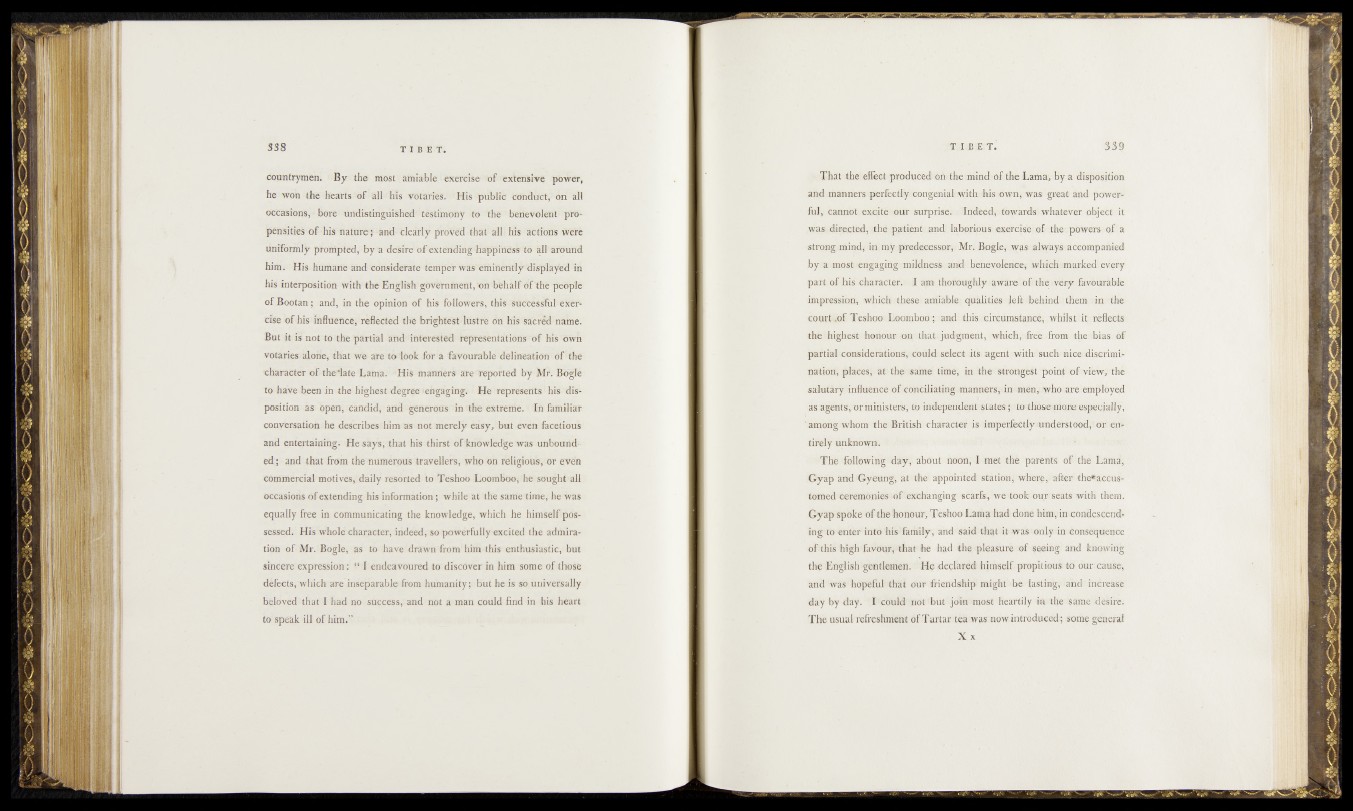
countrymen. By the mos t, arniable 1 exerciseOf extensive power,
he>won the' hearts Of all Ms votaries.! ! Mis -public Oonte'ct, on all
occasions, ■> börë: undistinguished' testimony -to the beileVöleïïï1 pfö1
pénsitiesöf ;his nature'}- and- clearly proVè’d that all his actions Were
Uniformly prompted, by-â desire' of-êxtendiHgfràppiilësSfô àll aróuhd
him. His humane and considerate tèmperi was'eminently'dîspiayed In
his interposition with thé Englishgövernment, embëhJdf Of Thë pteopîé
ofBootan; and, in the opinion of his followers, this^ücfeëSsIfnliekép-
else-of-his influence, reflected thé brighfest-ltistre On his sacrâd name.
But it 8 not to thé partial aikb interested -hêp¥e§enidtiöiÊtrdf his own
Votaries alone, that We ate *ÈPlöók for a 'favourable''dêlfefca'ÖÖUTOf^ the
character of thélate Lama. HiS mantlers 'are 'reported by Mr. BOgfe
to have been in the highest degree ’engaging. He represents I h8 ’disposition
as open, candid, and generous in the extreme. In familiar
conversation. 1® describes iàm as not merely easy, but eveti facetiouS
and entertaining. He says, that his thirst of “knowledge Was unbounded;
and that from the numerous travellers, who on religious,'Or even
commercial motives, daily resorted to TeshoO Loomböo,he sought all
occasions Of extending his information ; while at the same time, hé was
equally free in communicating the knowledge, which he himselRpos-
sessed. His whole character, indeed, so powerfully excited thé admiration
Of Mr.; Bogle, as to-have drawn from' him this enthusiastic, but
sincere expression : “ I endeavoured to'discover in him some of those
defects, which are inseparable from humanity ; but he is so universally
beloved that I had no success, and not a man could find in his heart
to speak dll of him.”
Tbat'dM$0eet; producèd.iiim¥.tke mind':n£ tbe Lama, by a disposition
and manners perfectly congenial with his own, was great and powerful,
Cannot excite our surprise; . ‘Indeed,.: towardisiwhftever abject it
was,directed, ékd pfriénfcandl labs^»i.'^»eisE;rof< :the< powers q£ a
strong mind, in,mÿ ptedeeessar,ï Mr. Bogie, was always accompanied
by-a most *engagiègi'm;ëdneskï; anid
part of his character; I am thoroughly ' ^Waïctbfr the jyitiry favourable
impression, which!these, amiable qnnàlitiES • lefe-behiridUtfismerin 'the
courtkof TeshootLaetafetw;- andi thisvi cireümàisÉiÉÉ^ iwhdlst îit;,, uèflects
the |highest honour an■ thatj ju d g in g , :wtteft,»ânè»frnm; ;é|mhfeihsë:0£
partial considerations, could select its agent vnth)i^Èhmitee!SKsséiêiæiij-
nation'1, places, at th© «aine time, in the1 strongest poinjhofwfeiv,1 thè
sahitàry influence 'Ofchpciliating -manners,'in men,. who are'employed
as agemsionniteikteA, to inflfepehd^^iàtéS':;utet'hisefd^e^e^eiali|;i:
among wlidm-îf^ British chanaote# isvimpe^Gtlymndelsteodpor en*-
tirely unknown. |j
The following day, about noon, I met the parents o’SHhe Lama,
.-©yap and'-Syèàng, at the appointed station, where, after Unaccustomed
cereffibniestof exchanging scarfs, we'ïtooteb^rîseàtè with thorn,
©yap spoke of the honour; Tofehoof fcâ*oea had dohh himv iuooiifiesoend-
ing'to-enter-into his family, and said ehqt
of this high favour, that he had the -pleasure of seeing and knowing
the English -gentlemen. He tdeçlàrèÉ frirfiseif. propj.tiorai^ tô'dbrf.cauæ,
and was hopeful that ouv friendship’ might’> be |astiffl^vilad~ïnèi%feé
day by day. ' l fcduM'£W sbut joiw toos* heartily lh;>!t|iè';%gmeiiâeMi'e.
The usual refreshment Of Tartar teh was now intrldmeed ; Siatfie general
X x